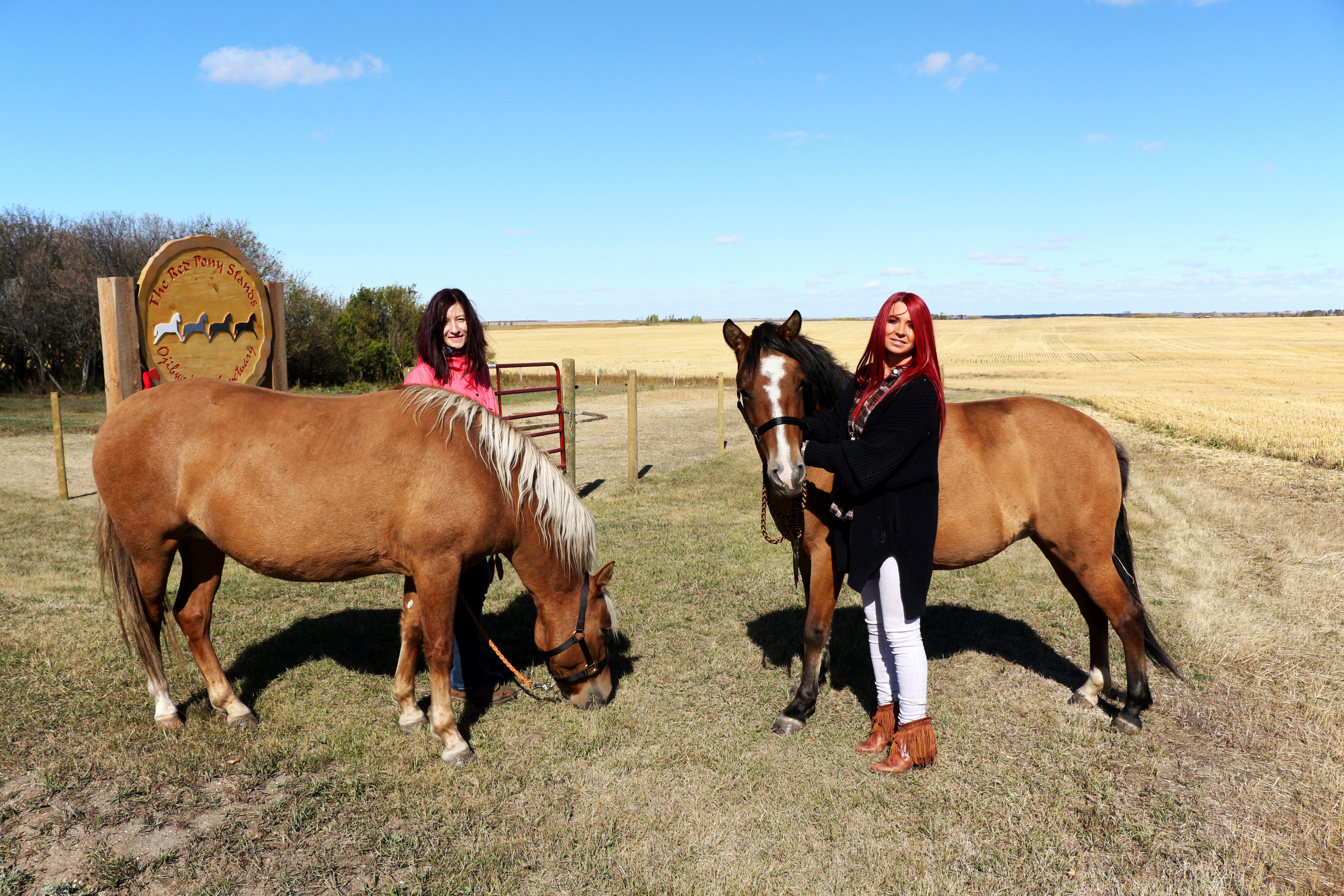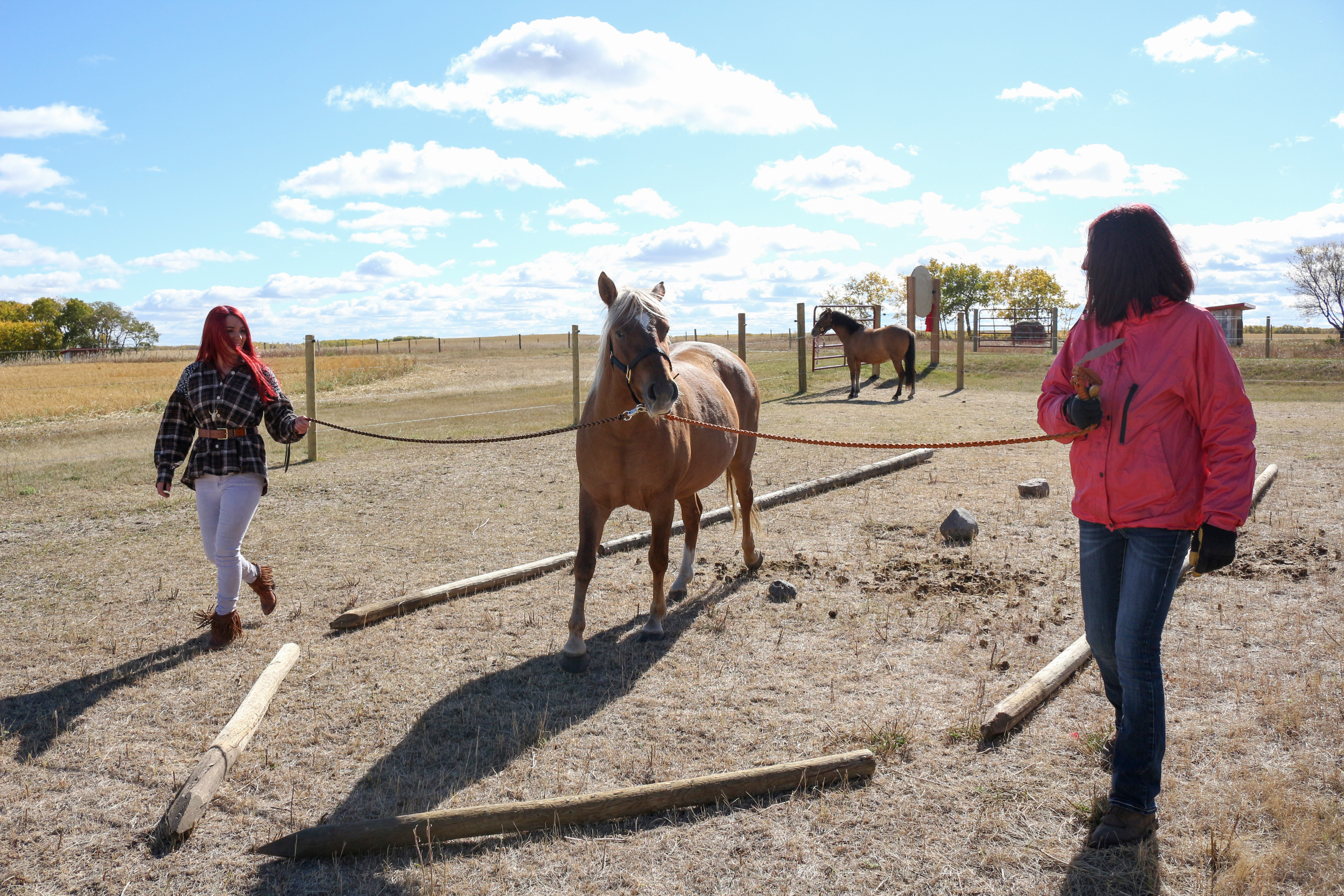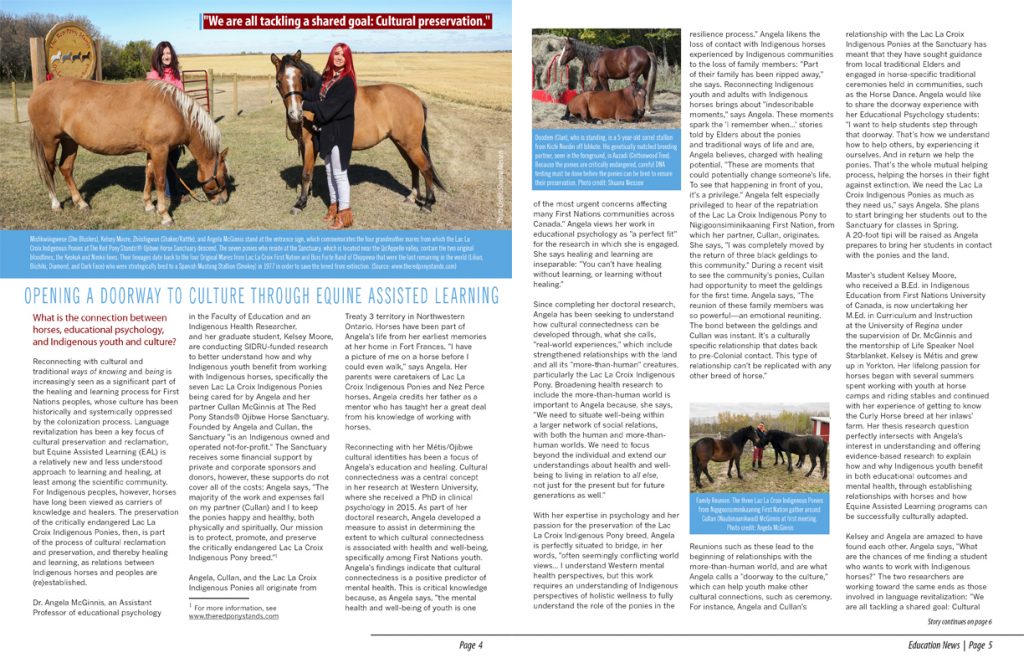
What is the connection between horses, educational psychology, and Indigenous youth and culture?
Reconnecting with cultural and traditional ways of knowing and being is increasingly seen as a significant part of the healing and learning process for First Nations peoples, whose culture has been historically and systemically oppressed by the colonization process. Language revitalization has been a key focus of cultural preservation and reclamation, but Equine Assisted Learning (EAL) is a relatively new and less understood approach to learning and healing, at least among the scientific community. For Indigenous peoples, however, horses have long been viewed as carriers of knowledge and healers. The preservation of the critically endangered Lac La Croix Indigenous Ponies, then, is part of the process of cultural reclamation and preservation, and thereby healing and learning, as relations between Indigenous horses and peoples are (re)established.
Dr. Angela McGinnis, an Assistant Professor of educational psychology in the Faculty of Education and an Indigenous Health Researcher, and her graduate student, Kelsey Moore, are conducting SIDRU-funded research to better understand how and why Indigenous youth benefit from working with Indigenous horses, specifically the seven Lac La Croix Indigenous Ponies being cared for by Angela and her partner Cullan McGinnis at The Red Pony Stands® Ojibwe Horse Sanctuary. Founded by Angela and Cullan, the Sanctuary “is an Indigenous owned and operated not-for-profit.” The Sanctuary receives some financial support by private and corporate sponsors and donors; however, these supports do not cover all of the costs: Angela says, “The majority of the work and expenses fall on my partner (Cullan) and I to keep the ponies happy and healthy, both physically and spiritually. Our mission is to protect, promote, and preserve the critically endangered Lac La Croix Indigenous Pony breed.”
Angela, Cullan, and the Lac La Croix Indigenous Ponies all originate from Treaty 3 territory in Northwestern Ontario. Horses have been part of Angela’s life from her earliest memories at her home in Fort Frances. “I have a picture of me on a horse before I could even walk,” says Angela. Her parents were caretakers of Lac La Croix Indigenous Ponies and Nez Perce horses. Angela credits her father as a mentor who has taught her a great deal from his knowledge of working with horses.
Reconnecting with her Métis/Ojibwe cultural identities has been a focus of Angela’s education and healing. Cultural connectedness was a central concept in her research at Western University, where she received a PhD in clinical psychology in 2015. As part of her doctoral research, Angela developed a measure to assist in determining the extent to which cultural connectedness is associated with health and well-being, specifically among First Nations youth. Angela’s findings indicate that cultural connectedness is a positive predictor of mental health. This is critical knowledge because, as Angela says, “the mental health and well-being of youth is one of the most urgent concerns affecting many First Nations communities across Canada.” Angela views her work in educational psychology as “a perfect fit” for the research in which she is engaged. She says healing and learning are inseparable: “You can’t have healing without learning, or learning without healing.”

Since completing her doctoral research, Angela has been seeking to understand how cultural connectedness can be developed through, what she calls, “real-world experiences,” which include strengthened relationships with the land and all its “more-than-human” creatures, particularly the Lac La Croix Indigenous Pony. Broadening health research to include the more-than-human world is important to Angela because, she says, “We need to situate well-being within a larger network of social relations, with both the human and more-than-human worlds. We need to focus beyond the individual and extend our understandings about health and well-being to living in relation to all else, not just for the present but for future generations as well.”
With her expertise in psychology and her passion for the preservation of the Lac La Croix Indigenous Pony breed, Angela is perfectly situated to bridge, in her words, “often seemingly conflicting world views… I understand Western mental health perspectives, but this work requires an understanding of Indigenous perspectives of holistic wellness to fully understand the role of the ponies in the resilience process.” Angela likens the loss of contact with Indigenous horses experienced by Indigenous communities to the loss of family members: “Part of their family has been ripped away,” she says. Reconnecting Indigenous youth and adults with Indigenous horses brings about “indescribable moments,” says Angela. These moments spark the ‘I remember when…’ stories told by Elders about the ponies and traditional ways of life and are, Angela believes, charged with healing potential. “These are moments that could potentially change someone’s life. To see that happening in front of you, it’s a privilege.” Angela felt especially privileged to hear of the repatriation of the Lac La Croix Indigenous Pony to Nigigoonsiminikaaning First Nation, from which her partner, Cullan, originates. She says, “I was completely moved by the return of three black geldings to this community.” During a recent visit to see the community’s ponies, Cullan had opportunity to meet the geldings for the first time. Angela says, “The reunion of these family members was so powerful—an emotional reuniting. The bond between the geldings and Cullan was instant. It’s a culturally specific relationship that dates back to pre-Colonial contact. This type of relationship can’t be replicated with any other breed of horse.”

Reunions such as these lead to the beginning of relationships with the more-than-human world, and are what Angela calls a “doorway to the culture,” which can help youth make other cultural connections, such as ceremony. For instance, Angela and Cullan’s relationship with the Lac La Croix Indigenous Ponies at the Sanctuary has meant that they have sought guidance from local traditional Elders and engaged in horse-specific traditional ceremonies held in communities, such as the Horse Dance. Angela would like to share the doorway experience with her Educational Psychology students: “I want to help students step through that doorway. That’s how we understand how to help others, by experiencing it ourselves. And in return we help the ponies. That’s the whole mutual helping process, helping the horses in their fight against extinction. We need the Lac La Croix Indigenous Ponies as much as they need us,” says Angela. She plans to start bringing her students out to the Sanctuary for classes in Spring. A 20-foot tipi will be raised as Angela prepares to bring her students in contact with the ponies and the land.
Master’s student Kelsey Moore, who received a B.Ed. in Indigenous Education from First Nations University of Canada, is now undertaking her M.Ed. in Curriculum and Instruction at the University of Regina under the supervision of Dr. McGinnis and the mentorship of Life Speaker Noel Starblanket. Kelsey is Métis and grew up in Yorkton. Her lifelong passion for horses began with several summers spent working with youth at horse camps and riding stables and continued with her experience of getting to know the Curly Horse breed at her inlaws’ farm. Her thesis research question perfectly intersects with Angela’s interest in understanding and offering evidence-based research to explain how and why Indigenous youth benefit in both educational outcomes and mental health, through establishing relationships with horses and how Equine Assisted Learning programs can be successfully culturally adapted.

Kelsey and Angela are amazed to have found each other. Angela says, “What are the chances of me finding a student who wants to work with Indigenous horses?” The two researchers are working toward the same ends as those involved in language revitalization: “We are all tackling a shared goal: Cultural preservation,” Angela says. The actual preservation of the critically endangered Lac La Croix Indigenous Pony extends as a metaphor for cultural and identity preservation: “Their mere presence is a counternarrative to the colonial narrative of the extinction of Indigenous horses to the Americas,” says Angela. Indeed, the Lac La Croix Indigenous Pony’s survival itself inspires hope. But beyond that, Angela feels that interaction with Indigenous horses gives “Indigenous youth opportunities to connect with horses who have resilience and strength, like their own, that they can identify with, a culturally specific story,” she says.
What exactly is Equine Assisted Learning (EAL)?
Snowshoe and Starblanket (2016) state that EAL “is a relatively new approach to knowledge acquisition that draws primarily on the tenets of experiential learning, that is, learning through hands-on experience with the horse (Dell, Chalmers, Dell, Sauve, & MacKinnon, 2008).”
To deepen her understanding of EAL, Kelsey received EAL certification in August at Cartier Farms, near Prince Albert. Cartier Farms teaches that establishing an experiential hands-on working relationship with horses, with their sensitivity, non-verbal communications, resilience, and forgiving ways, can be an effective approach to learning, to self-knowledge, and to self-evaluation.
Angela, who has been guided by the traditional Elders, Knowledge Keepers, and communities with whom she has worked, sees the potential for healing and learning in culturally adapted EAL. Angela views horses as “more-than-human co-constructors of knowledge.” Horses have much to teach us about the land and living on the land, she says. Elders and Knowledge Keepers have taught Angela that, with their four feet always on the ground, horses have a greater connection with Mother Earth, and through this connection, the Creator. Thus, traditionally, horses have been considered a source of maintaining and recovering holistic wellness.
Upon the arrival of Angela’s first Pony at the Sanctuary, a beautiful stallion, affectionately named Sagineshkawa (Pleasure with my Arrival), she says, “I realized that I should not rush things. I needed to slow down and have humility, especially around a powerful being like a horse…This was the horse that I had to pay attention to and listen to spiritually.” Angela is grateful to all her ponies for their patience in teaching her. Kelsey’s experiences with horses have similarly given her the understanding that she must “slow down and be present in the moment,” she says. “Helping humans slow down is a way that the horses care for us,” says Angela. She views the horse-human relationship as one of mutual caring: “We are caretakers of them and the land, but the ponies also take care of us.”
Yet, there is an urgency that requires speed in this research due to the need for Indigenous youth to be able to access culturally adapted healing and learning programs. As a mother of a toddler, Kelsey had intended to move a bit slower with her research, but she says everything is moving much quicker than she planned or expected. Kelsey’s research, using what Angela describes as “a pure Indigenous research method,” seeks to understand the spiritual and cultural connections between Indigenous youth and Indigenous horses. Incorporating ceremony as research, Kelsey is documenting her interactions and deep listening experiences with the ponies, along with the conversations she has with Elders and Knowledge Keepers to make sense of what she observes.
The two researchers are already envisioning and talking about future plans. Angela says, “We hope to apply for an operating grant to help Kelsey set up her own Indigenous-centered Equine-Assisted Learning and healing program in the community, following the completion of her academic work.”
The Sanctuary has recently gained international attention. It will be featured in a short documentary film currently being produced by National Geographic as part of the Natural Connections Project. The film will document how EAL contributes to the well-being of First Nations youth. Through the film, Angela hopes to showcase “how Indigenous communities are using horses to connect with culture, strengthen positive relationships, and learn through activities with horses and nature.”
By Shuana Niessen
Credits for photos below: Shuana Niessen 2018
Follow us on social media
